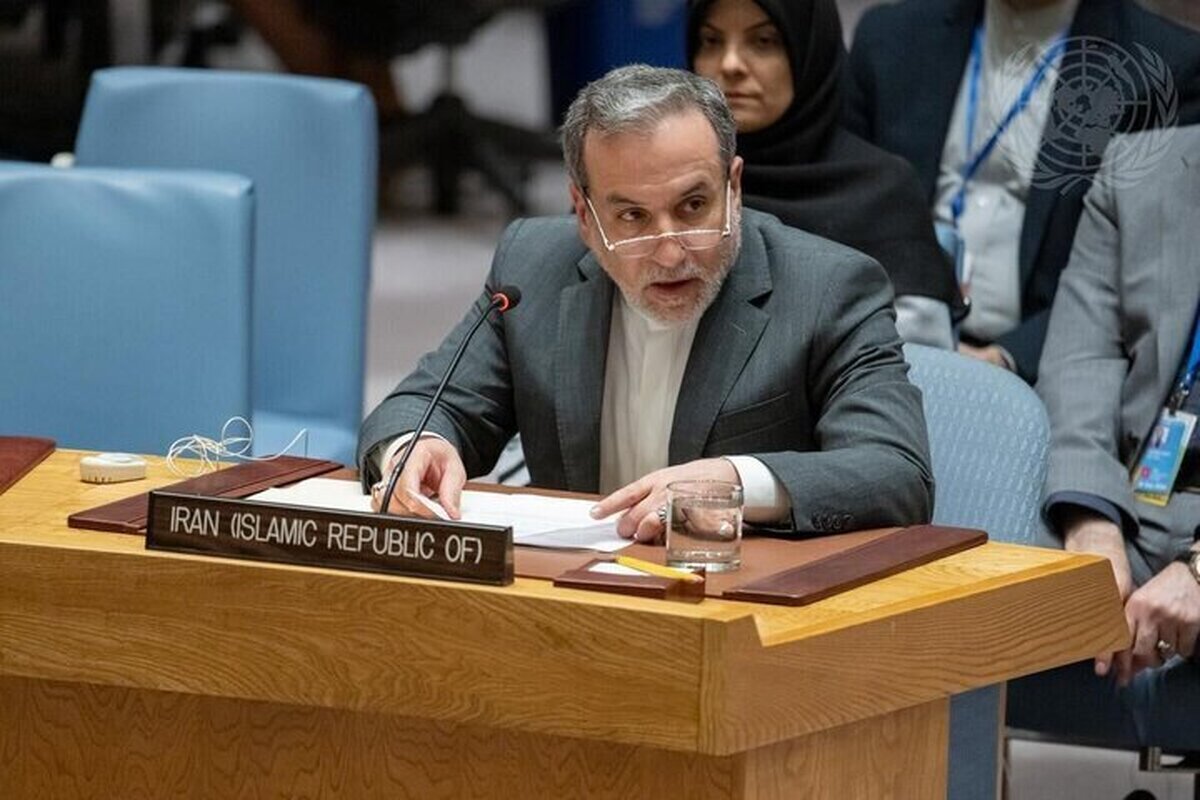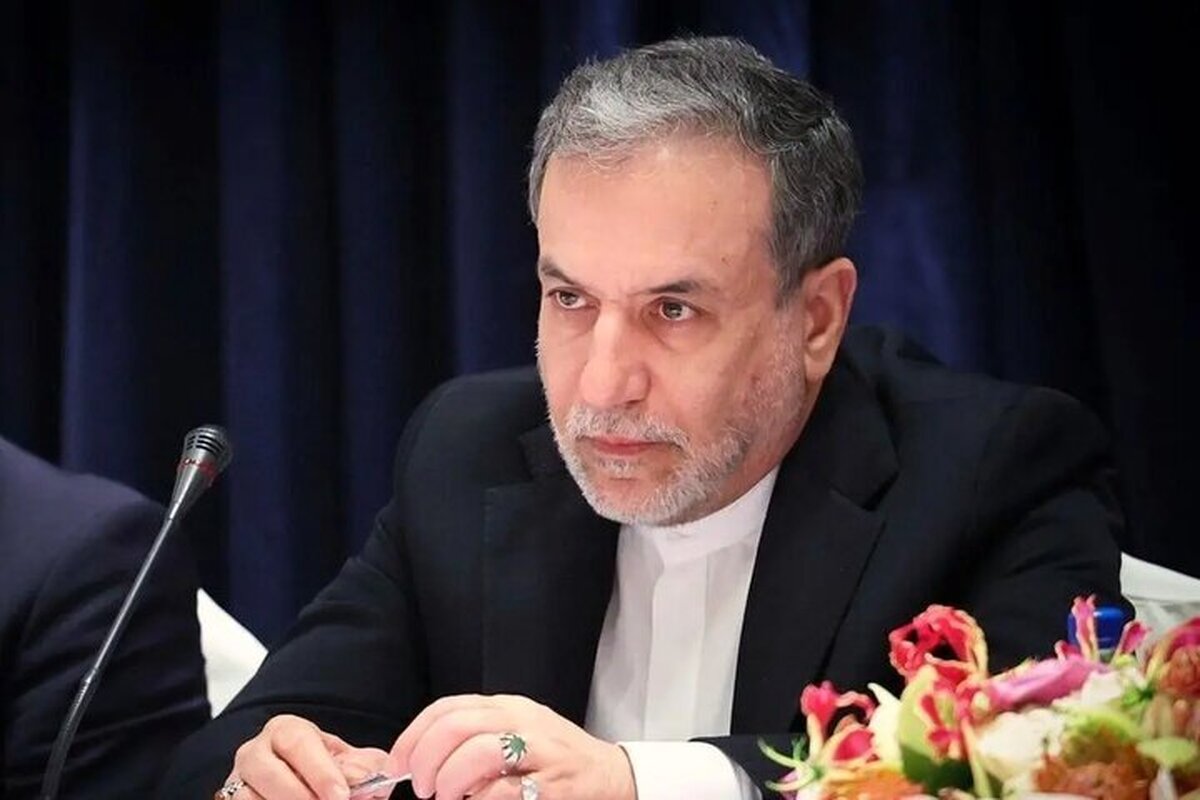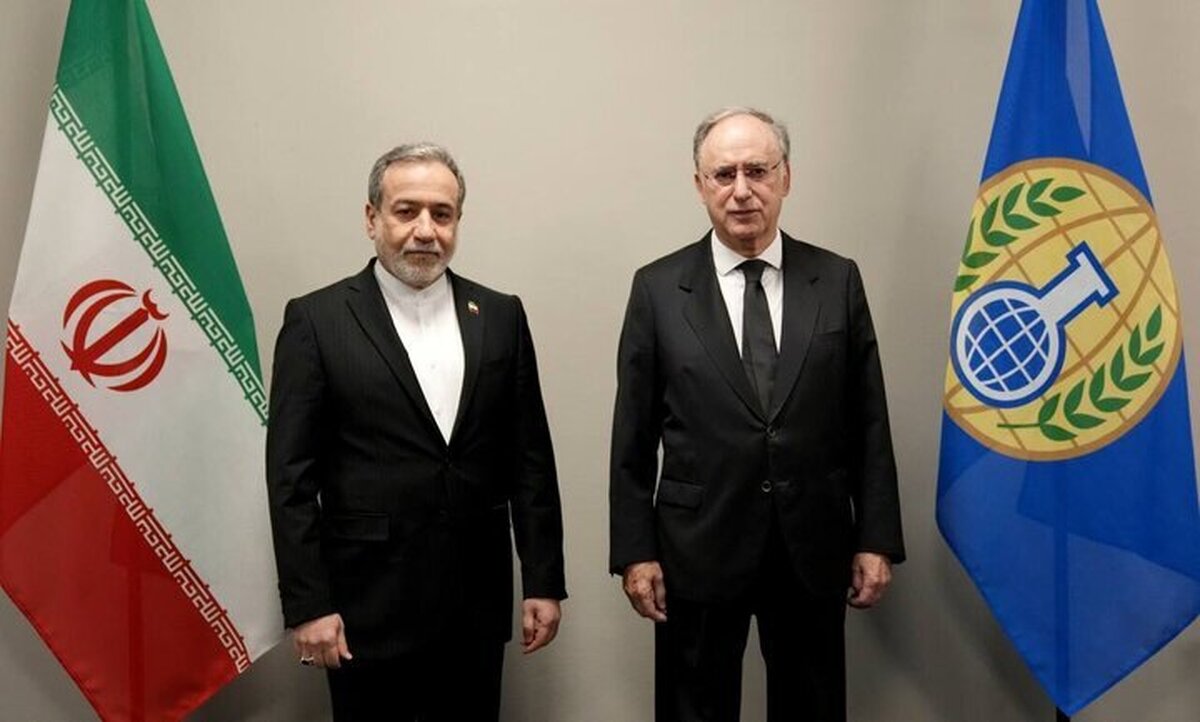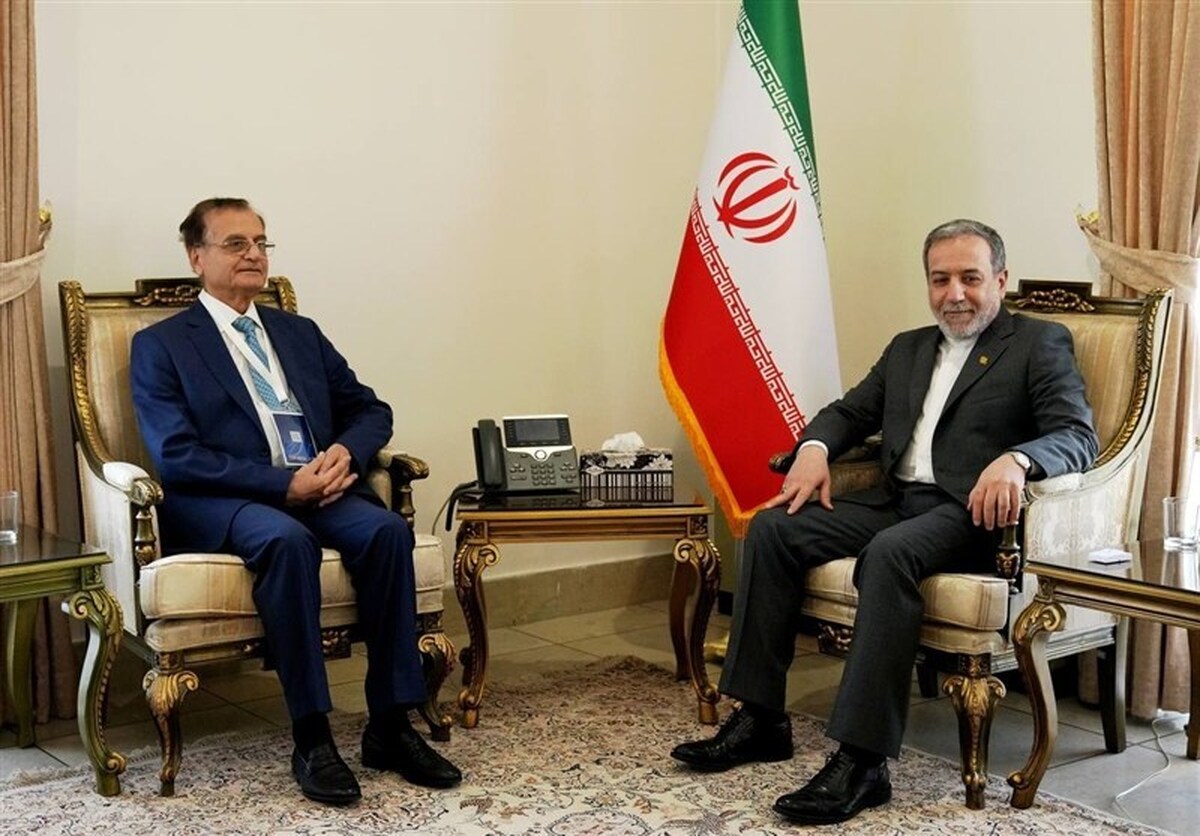
Iran's initiative to resolve Syria crisis underway: Araghchi

The Iranian foreign minister has warned against the collapse of the Astana Format for peace in Syria, adding that Iran's initiative for a permanent solution to the Syrian crisis is underway.
EghtesadOnline: Iranian Foreign Minister Abbas Araghchi made the remarks during a lengthy interview to Al-Araby Al-Jadeed while on his way home from his visit to Ankara on Monday evening, in which he discussed subjects including current developments in Syria, where Iran has long supported President Bashar al-Assad's government, Iran's relations with Saudi Arabia, recent tension around Iran's nuclear programme, and Israel's war on Gaza.
The following is the full text of the interview republished from the Al-Araby Al-Jadeed's website:
The developments in northwestern Syria were the focus of your visits to Syria and Turkey. How will you assess the results of your talks in Damascus and Ankara concerning these developments and ways to resolve them?
The terrorist groups have advanced in Syria but were stopped by the Syrian army and popular resistance in some areas which forced them to pull back, while they made gains in other areas. The situation on the ground is dynamic and fast-changing, with both sides attempting to alter the reality on the ground in their favour.
Right now there has to be political communication between the key countries in the region, and also states whose nationals have become involved in this crisis. Consultations like this are vital as a first step to understand one another's positions, in order to clear up misunderstandings and prevent miscalculations.
Naturally, any development between Muslim states in the region will generate benefits and ramifications which create grounds for their involvement in the issue. In recent developments, high-level consultations should take place between Syria and Iran due to their historic bonds and ongoing shared positions so as to coordinate their actions.
There should also be communication and consultation between countries with influence [on the Syrian issue] - this is why I visited Turkey and held discussions with its foreign minister [Hakan Fidan].
Iran and Turkey have aligning views on many regional and international issues, and naturally there are also differences. In both cases, we engage in dialogue, coordinating and cooperating in matters we agree on and seeking solutions through dialogue for what we disagree on. If a solution can't be found, we must understand each other well to prevent misunderstandings.
As part of this tour, I'll also engage with other influential states, and those with legitimate and shared interests and concerns, like their nationals being involved in the extremist groups. Ultimately, the Islamic world and region need a unified vision, especially on matters like terrorism and how to confront the Zionist entity, which is the source of the crisis.
Will you also visit Russia?
Yes I intend to visit Russia, Iraq and maybe other states, and work is underway to arrange the visits.
Iran has reacted most strongly against the advance of Syrian opposition factions and expressed its deep concern. Do you think the diplomatic tour you are conducting will be able to alleviate these concerns?
The expansion and growing power of terrorist groups in Syria serves no country and may harm Syria's neighbours more than Iran. I believe these neighbours, like Turkey, Iraq, and Jordan, have greater concerns. These countries are affected more quickly by developments in Syria, and if terrorism spreads there, these three countries—due to their long borders with Syria—will face threats. Meanwhile, our region needs peace and stability.
If we aren't vigilant, the experience of past years shows the region can be destabilised. We have the example of Islamic State (IS), its crimes, and the consequences it had for countries in the region. There is also a stark possibility that similar groups could emerge. Therefore, there are shared concerns around the spread of Takfiri-terrorist groups in Syria, and we must all work together to confront them.
The Syrian opposition factions are diverse. While Iran describes them all as terrorists, other countries in the region don't agree. Do you consider every Syrian opponent of Bashar al-Assad a terrorist?
The issue is not with opposition to Mr. Bashar al-Assad; opponents and critics can always express their views by legitimate means and explain the reasons for their opposition. However, this differs from engaging in armed operations against a government that has a seat at the United Nations and holds the responsibility of defending the land and country. Firstly, we face a group that the UN recognises as a terrorist organisation, namely Hayat Tahrir al-Sham (HTS), or Jabhat al-Nusra. There are certainly those who oppose [the government] in Syria, some of whom the Syrian government has worked with and engaged in dialogue. The term "terrorists" refers to groups that employ weapons and violence for political goals, killing innocent people. The UN has confirmed the nature of these groups.
Events in Syria are a result of the crisis remaining unresolved for 13 years. Why have the two side's allies in the region failed to find a solution to end this crisis?
This is what we were doing in the Astana process, which was created by Iran, Turkey and Russia with the intention to support the Syrian people and government to implement reforms and achieve calm, national reconciliation and related issues. The three countries pledged to restrain the factions affiliated with them, and I'm very concerned about the Astana process's collapse, and that the failure to achieve its goals is causing its breakdown, while no easy alternative to this process exists. After consulting with my Turkish counterpart, Mr. Fidan, we agreed to hold a meeting on the Astana process quickly, which is a positive step forward.
For its part, the opposition accuses the Syrian regime of not abiding by the Astana ceasefire in the de-escalation zones, and of seizing control of those areas that have recently come under opposition control. What's your view?
Look, we don't deny the Syrian government has made mistakes - or maybe is making them - as are its opponents. However, when it comes to the armed terrorist groups, their nature and aims are clear. Yes, the crucial thing is that if there's a problem, we should consider how to solve it. I believe that when an issue arises in a family, no one would bring in a terrorist to kill their brother. What are being put forward are pretexts. We mustn't forget that Aleppo and Idlib are part of Syria's landmass, and its territorial integrity must be respected.
Does Iran intend to send forces to Syria to confront opposition attacks as it did before?
This is subject to request by the Syrian government. If it makes a request for this, we will consider it.
Has that not been requested of Iran yet?
The Syrian army and resistance forces there are working to repel and resist the attacks.
Did you bring an initiative to Ankara to discuss with Turkey and then Russia regarding the current crisis?
Yes. We're at the start of the political consultation phase, and efforts to contain the escalation are underway to preserve the lives of the Syrian people and open a pathways to send aid to those affected by terrorist attacks. In parallel with this, we will re-activate the Astana process and remind the UN of its responsibility to maintain global peace, while highlighting the need to intensify action against terrorist groups listed by the organisation. We will also broaden consultations with other important regional countries, like Jordan, Iraq, Egypt, Saudi Arabia, Qatar, and others. We'll conduct further consultations with states whose nationals have been illegally transported into Syrian territory by Jabhat al-Nusra, HTS, or other terrorist groups.
There is a series of preparations underway to de-escalate the situation and establish an opportunity to propose a permanent solution and keep following up in order to achieve it.
Some in Tehran accuse Turkey of directing the Syrian opposition's current operation. What is your official position on this?
Turkey, like any other player, has ties and common interests in Syria, as well as concerns and anxieties. We are always in consultation with Turkey about how to address these concerns and secure the interests arising from these ties and commonalities. The Astana process was established for this purpose, to establish mechanisms to prevent the countries’ concerns from becoming confrontations down the line. We expect Turkey will take steps in this process.
What was the outcome of your discussions with the Turkish Foreign Minister?
We had a responsible, frank, constructive, and transparent conversation. Just as we spoke about the situation in Palestine during the last visit, this time the discussions included the Syrian issue. We always aim for consultation and dialogue regarding our disagreements and to strengthen the alignment of our views on multiple issues. In this meeting I emphasised that the Zionist entity's role in creating the tension, unrest and confrontation in the region and Syria shouldn't be ignored. Overlooking this is a big mistake, and we fully support the Syrian government.
You know Turkey has proposed a meeting between Turkish President Recep Tayyip Erdogan and Bashar al-Assad several times over the past two years. However, Damascus rejected it and set conditions. What's your view on what some are saying - that if this meeting had taken place, recent developments would not have occurred?
The Islamic Republic of Iran has always supported dialogue between the Turkish and Syrian governments, encouraging both sides to engage in this dialogue. The Syrian government, for its part, has and continues to request Turkey's withdrawal from Syrian territory it is controlling, which is not an unreasonable request; or for Turkey to set a timeline for its withdrawal. This is Syria's position. Following this, no dialogue has taken place between them. We still believe dialogue between the two sides is essential, but Syria's request isn't illogical. Iran is convinced that while dialogue between Turkey and Syria is essential, entering into fruitful dialogue from an equal standpoint requires understanding and respecting the Syrian government's demand that its sovereignty and territorial integrity be accepted, which isn't unreasonable.
Some say Iran was pressuring Damascus not to meet with the Turkish president while Russia was doing the opposite. How would you respond?
No, the situation is the opposite. We've been recommending dialogue at any level. Typically, dialogue begins at lower levels and progresses to higher levels and between leaders. The important thing is for good relations to be established between Syria and Turkey, with both of whom we have good relations. We recommended dialogue. This condition [the withdrawal of Turkish forces from Syrian territory] was set by Syria's government and cannot be considered unreasonable.
Does Iran still believe its policy of supporting the Syrian regime since the beginning of the Syrian crisis was the right choice?
Internal issues in Syria are a matter for Syria and its people. Our view of Syria stems from it being on the front lines of the resistance against the Zionist entity. Our approach has been that what occurred in Syria was largely influenced by external forces - in particular the Zionist entity - in order to take Syria out of the axis of resistance. If the goal was genuinely achieving democratic reforms, a different approach should have been followed.
However, the real agenda behind the scenes, which many countries of the region didn’t pay much attention to, is that there's a Zionist conspiracy to remove Syria from the resistance axis. The Islamic Republic of Iran's involvement and support for the Syrian government came from this perspective. We supported any just and peaceful reforms. Essentially, the goal of the Astana process was to support reforms. Although the process has not made suitable progress, which is a weakness, the fundamental issue still stands: there is a Zionist conspiracy to remove Syria from the resistance.
Some believe there is a regional and international plan to uproot Iran's proxies in the region, and that after Lebanon and Syria, it will be Yemen and Iraq's turn. How do you respond to that?
These aren't Iran's proxies. They're resistance groups fighting for their just causes. The Palestinian people aren't Iran's proxy; they're fighting for the liberation of their land. The same applies to Lebanon, which is still battling for the liberation of its land. The resistance factions intervened to support Palestine. Today, Yemen's only problem is Gaza. I want to say that the views of many Western and Arab media outlets on this issue stem from the lack of a deep understanding of the basis for the perspective and connections between nations and a Muslim people who have been suffering for decades from the occupation of Palestinian land, the systematic killing of a defenceless people, and Western silence.
It's wrong to say that Iran has proxies in the region; this isn't the case at all. There is a trend of thinking which seeks justice and demands it in the region, which we call the resistance, which stands against the Zionist entity, its attacks and crimes. These groups are fighting for the liberation of their lands, for the Palestinian people's right to self-determination, and for a just cause. The Islamic Republic doesn't command these movements, nor does it have organisational ties with them. Rather it supports their cause, backs them, and provides assistance if needed.
It's nearly two years since the Iranian-Saudi rapprochement. How do you assess the progress in the relationship and are you satisfied?
Our relations are progressing well. Iran and Saudi Arabia are two major countries in the region, and I'm convinced that regional peace, stability, calm, and progress depend on peace, stability, and calm between these two countries and the role they play.
Over the past two years, we have taken actions I believe have been effective, as tensions in the region have significantly declined. Consequently, Iran's relations with the Persian Gulf states have progressed. The region is now in a better situation, including the Persian Gulf region, and this benefits all the countries in the area. God willing, we will continue on this trajectory.
Do you expect Iranian-Saudi relations to have a positive impact on Trump's policies towards Tehran over the next four years?
These are two separate things. Our relationship with Saudi Arabia is separate from what is happening between us and America.
Iran constantly says it will decisively respond to the Israeli attack. A while ago, you spoke about how developments in the region could affect this response. What do you mean by these developments? A ceasefire in Lebanon and Gaza, for example?
Our intention is clear. What the Zionist entity did on October 26th was a new attack on the Islamic Republic of Iran, which has the right to respond and exercise its right to legitimate self-defence as a fundamental right recognised in international law and the UN Charter. We reserve the right to respond. An attack occurred on our land, and we must respond to it.
However, the Islamic Republic has always acted with wisdom and intelligence and will respond at a suitable time and in a suitable manner. Naturally, regional developments will influence the timing and nature of this response. In any case, we will take into account the interests of the region, as well as the Palestinian resistance, Lebanon, and Syria. Ultimately, we will make a decision that benefits Iran and the region, and carry this out.
Does that mean regional developments will affect the manner of the attack or whether the attack itself will take place?
Our right to respond is reserved, but when and how will we respond? We will take all regional factors into account.
Have you received an American message regarding the ceasefire in Gaza?
No, we haven't.
Do you expect the aggression on Gaza to end soon, as in Lebanon?
I believe there is a problem when it comes to the war on Gaza, which is that Mr Netanyahu faces a predicament. The official objective of Israel's invasion of Gaza and for committing all these crimes and massacres was to eliminate Hamas and free its captives. However, today, despite many blows, Hamas remains intact and hasn't been destroyed. The captives haven't been freed either. So if Israel enters negotiations with Hamas for a ceasefire and releasing the hostages, this signals Israel's defeat. It means Israel has failed to achieve its goals and has been forced to negotiate with Hamas, which it sought to destroy. The same happened with Hezbollah, and no one can say Israel won in Lebanon. Its forced entry into negotiations was due to its losses, which implies a defeat for Israel. Therefore, this is Israel's dilemma in the Gaza war, and the world must intervene to put an end to the crimes of the Zionist entity and its prime minister, and end the genocide.
The nuclear issue has recently escalated. A resolution was adopted against Iran by the International Atomic Energy Agency (IAEA) Board of Governors, and some expect Europe will move to trigger the dispute resolution mechanism in the nuclear deal to reimpose sanctions and reactivate UN resolutions against you. If Europe does this, how will Tehran respond?
The Americans and Europeans themselves know that Iran will respond; we have officially and explicitly informed them of this. They must decide whether they want to head towards confrontation or cooperation. Our choice is cooperation, and we invited Mr. Rafael Grossi [the Director-General of the IAEA] to Tehran before the Board of Governors meeting - opening a pathway to cooperation and a new chapter of collaboration with him. However, the Westerners prevented this and issued the resolution. We hope this path will be corrected and that they will return to cooperation which can lead to a negotiated resolution.
But you expressed doubt that the recent negotiations with Europe would yield any results. What's behind this pessimism?
There are many reasons for pessimism. In any case, if the process of negotiations and cooperation doesn't progress, and we can't reach an agreement following negotiations, and they move towards triggering the dispute resolution mechanism, then we will reach a crisis point.
Will Tehran negotiate with Trump in his second presidential term after refusing to do so in the first?
The new US administration hasn't yet been formed or announced its positions. It's unclear whether it wishes to address the harm done by past performance or not, and whether it wishes to operate based on respect, responsibility and commitment to assessing the interventions made by past administrations, since the 1952 coup [against Mohammed Mossadegh's government], to openly supporting [former Iraqi President] Saddam [Hussein] in the [1980s Iran-Iraq] war. These things need to be clarified first.
Currently, we do not intend to engage in dialogue because there are no foundations for such dialogue. We must wait and see how the new US administration will sketch out its policies and how it will enact them, and then we will shape our own policy accordingly.




